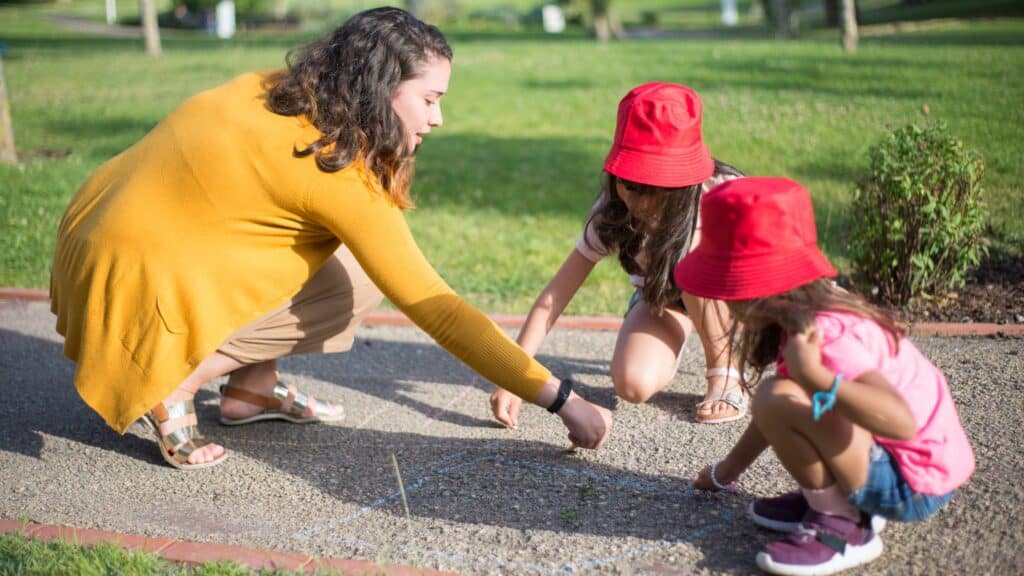From job searching to phone screens to interview reviewing nanny responsibilities, there’s so much that goes into securing your next role. By the time you get to your trial day with your potential new employer, it almost feels like a first date: equal parts exciting, nerve-wracking and full of possibility.
You want to make a great first impression, but you’re also wondering inside: will this be a good fit for me, too? That’s the heart of a working trial day if you’re a nanny searching for your next great role. A working trial is not just about the family evaluating you, it’s also an opportunity to give you a real look inside the family’s routines, expectations and home dynamic. A trial gives you the chance to showcase your skills and connect with the children, while also making sure this is a role where you’ll feel respected, supported, and able to thrive.
What Is a Trial Day for Nannies?
A trial day (or “working trial”) is a short, paid period where you step into the family’s home and routine to care for their child(ren) in a real-world setting and with real-world situations (think: tantrums, spilled milk, naptime shenanigans).
Trial periods can vary: some families schedule a single day, while others prefer a longer stretch, like a weekend, a few days, or even a week. In rare cases (usually for live-in positions), trials can extend a bit longer. In our experience, trial days for full-time live-out nannies typically last around 3-4 days.
During this time, you’ll usually handle the core responsibilities outlined in the job description like childcare, light household duties related to the kids, and anything discussed during interviews. The goal isn’t to take on everything at once, but to give both you and your prospective employer a genuine sense of compatibility and comfort.
Think of the trial as if the job has already been offered. Arrive prepared, punctual, and professional, ready to give your best. Your trial days will give you a preview of what day-to-day life could look like if you decide to work together.
Remember that trials should always be paid. Your time, effort, and expertise are valuable, even in a “trial” setting. Payment rates and terms should be discussed beforehand with your family.
The Benefits of a Trial Day for Nannies
While a trial might sound like it’s all about the family testing you out, it’s actually a huge opportunity for you as well to see what the job is really like before committing. As a professional nanny, here’s what you’ll gain from this sneak peek:
1. A chance to showcase your skills
Interviews (especially virtual ones) only go so far. A trial lets you demonstrate how you connect with children, handle transitions (like nap time or meals), and keep calm when the unexpected happens (because nothing about watching kids is ever predictable). Families often feel reassured when they see your expertise in action. Bonus: if you have a special nanny credential now is the time to bubble it back up for your employer and show it off.
2. A realistic look at the job
You’ll see how the family’s routines actually play out, what the household dynamic feels like, and whether the role matches what was described in the interview. Sometimes job descriptions and what’s expressed in an interview sounds one way, but feels and looks very different in practice.
3. A better sense of fit
Do you feel comfortable in their home? Are their expectations clear and reasonable? Is there mutual respect in the way you’re treated? These are just as important as whether the kids enjoy story time with you or how well you’re able to manage the family schedule.
4. Clarity before committing
Saying “yes” to a family is a big decision. A trial allows you to make that choice with confidence, knowing you’ve experienced a taste of what the day-to-day will really look like.
At its best, a trial is a two-way street: families see what you bring to the table, and you get to decide if this is truly a place where you can thrive, feel valued and cultivate a rewarding, long-term partnership.
How to Prepare Before Your Trial Day
A trial day is your chance to shine and to really get a feel for whether the role is the right match for you because you can only glean so much from a job description and interview. And, just like your family is prepping for this trial, you should too. It can go a long way toward making you feel confident and supported.
1. Clarify expectations ahead of time
Before the trial begins, ask the family what they’d like you to focus on: childcare, light household tasks, or a mix. Ideally, you’ll take the reins of some of the responsibilities the family envisions you taking on (and which were discussed during your interviews). Getting clear on duties, hours, and structure during the trial days will help you avoid surprises and ensure you’re prepared.
2. Ask about the schedule
Request a copy of the family’s daily routine in advance so you know what to expect (naps, mealtimes, school pickups). You may also ask for details (either in advance or day-of) regarding rules around diet, playtime or emergency situations. It’s much easier to step in smoothly when you’re familiar with their rhythm.
For the full rundown of how to prepare for your working trial, download our Working Trial Guide for Nannies, which will ensure you’re fully prepared and ready for your trial days.
Tips for a Successful Working Trial Day for Nannies
Your trial day isn’t about perfection or for showing off all of your skills in such a short period of time. The best thing you can do for you as a nanny during a working trial is to show up authentically (just be you!), give your best and create a safe and positive environment for the kids. Here are some tips to help the day go smoothly:
1. Be proactive but not overbearing
Show initiative—like offering to prep a snack or suggesting an activity—but avoid taking over or drastically changing schedules and routines without checking in. Families want to see confidence paired with respect for their status quo.
2. Communicate openly and often
Ask clarifying questions and share updates during the day, and at the end of each day. This reassures the parents you’re attentive, engaged and eager to learn. It also helps prevent small misunderstandings from becoming bigger issues. For example, if the child as a 1 pm naptime, you may want to ask if the family would like to put them down at 1pm or if there’s any wiggle room should you be involved in a fun playtime activity.
3. Stay flexible
Schedules shift, naps get skipped, and tantrums happen. How you handle changes calmly and creatively can show a family you’re adaptable and trustworthy.
👉 Want a step-by-step roadmap? Download Hello Nanny!’s Working Trial Guide for Nannies to learn how to shine during your trial day.
What to Do After Your Trial Day Is Over
When your trial wraps, your job isn’t quite done. It’s important to reflect and communicate next steps. In fact, we suggest taking notes after each trial day to help refresh your memory when it’s time to ask yourself if working with this family is the right fit. Your notes don’t have to be long or formal—quick bullets or shorthand in your notes app works great. Here are a few other tips to help guide you after your working trial days are over.
1. Reflect on your own experience
Ask yourself: Did I feel comfortable with the children? Was the family’s communication style a good fit? Can I see myself in this role long-term? A trial is as much for you as it is for them.
2. Follow up professionally
Send a short thank-you note or text within 24 hours. Express gratitude for the opportunity and mention something specific you enjoyed about the day. This reinforces your professionalism and genuine care. If you’re working with an agency, check in with your recruiter and debrief the experience with you.
Trial days (and after they’re over) don’t have to be nerve-wracking. Grab our guide and walk in with confidence and leave with clarity.
Finding Your Fit: Turning a Trial into Your Next Great Role
A working trial isn’t a test you have to “ace.” It’s a chance to see if this role feels like home for you, too. The right family will value your skills, respect your boundaries, and make you feel like an essential part of their team. A trial gives you the clarity to know whether this opportunity is the beginning of a great long-term fit or a good indicator that it’s best for your wellbeing to keep looking.
If you’re preparing for a working trial as a nanny and want more guidance, we’ve put together the Hello Nanny! Nanny Working Trial Guide, complete with how to clearly define working trial terms (including compensation and how you’ll be evaluated), different trial structures you can expect and what exactly you should do after the working trial for nannies is over.



